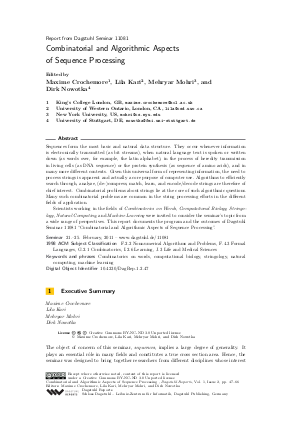Combinatorial and Algorithmic Aspects of Sequence Processing (Dagstuhl Seminar 11081)
Authors Maxime Crochemore, Lila Kari, Mehryar Mohri, Dirk Nowotka and all authors of the abstracts in this report
-
Part of:
Issue:
Dagstuhl Reports, Volume 1, Issue 2
Part of: Volume: Dagstuhl Reports, Volume 1
Part of: Journal: Dagstuhl Reports (DagRep) - License:
 Creative Commons Attribution-NonCommercial-NoDerivs 3.0 Unported license
Creative Commons Attribution-NonCommercial-NoDerivs 3.0 Unported license
- Publication Date: 2011-06-29
File

PDF
DagRep.1.2.47.pdf
- Filesize: 0.91 MB
- 20 pages
Document Identifiers
Subject Classification
Keywords
- Combinatorics on words
- computational biology
- stringology
- natural computing
- machine learning
Metrics
- Access Statistics
-
Total Accesses (updated on a weekly basis)
0Document
0Metadata
Abstract
Sequences form the most basic and natural data structure. They occur whenever information is electronically transmitted (as bit streams), when natural language text is spoken or written down (as words over, for example, the latin alphabet), in the process of heredity transmission in living cells (as DNA sequence) or the protein synthesis (as sequence of amino acids), and in many more different contexts. Given this universal form of representing information, the need to process strings is apparent and actually a core purpose of computer use. Algorithms to efficiently search through, analyze, (de-)compress, match, learn, and encode/decode strings are therefore of chief interest. Combinatorial problems about strings lie at the core of such algorithmic questions. Many such combinatorial problems are common in the string processing efforts in the different fields of application. Scientists working in the fields of Combinatorics on Words, Computational Biology, Stringology, Natural Computing, and Machine Learning were invited to consider the seminar's topic from a~wide range of perspectives. This report documents the program and the outcomes of Dagstuhl Seminar 11081 ``Combinatorial and Algorithmic Aspects of Sequence Processing''.
Cite As Get BibTex
Maxime Crochemore, Lila Kari, Mehryar Mohri, and Dirk Nowotka. Combinatorial and Algorithmic Aspects of Sequence Processing (Dagstuhl Seminar 11081). In Dagstuhl Reports, Volume 1, Issue 2, pp. 47-66, Schloss Dagstuhl – Leibniz-Zentrum für Informatik (2011)
https://doi.org/10.4230/DagRep.1.2.47
BibTex
@Article{crochemore_et_al:DagRep.1.2.47,
author = {Crochemore, Maxime and Kari, Lila and Mohri, Mehryar and Nowotka, Dirk},
title = {{Combinatorial and Algorithmic Aspects of Sequence Processing (Dagstuhl Seminar 11081)}},
pages = {47--66},
journal = {Dagstuhl Reports},
ISSN = {2192-5283},
year = {2011},
volume = {1},
number = {2},
editor = {Crochemore, Maxime and Kari, Lila and Mohri, Mehryar and Nowotka, Dirk},
publisher = {Schloss Dagstuhl -- Leibniz-Zentrum f{\"u}r Informatik},
address = {Dagstuhl, Germany},
URL = {https://drops.dagstuhl.de/entities/document/10.4230/DagRep.1.2.47},
URN = {urn:nbn:de:0030-drops-31554},
doi = {10.4230/DagRep.1.2.47},
annote = {Keywords: Combinatorics on words, computational biology, stringology, natural computing, machine learning}
}
